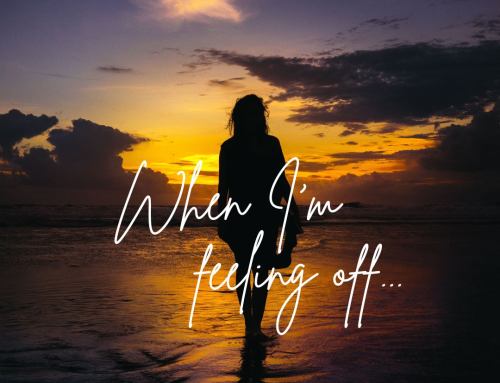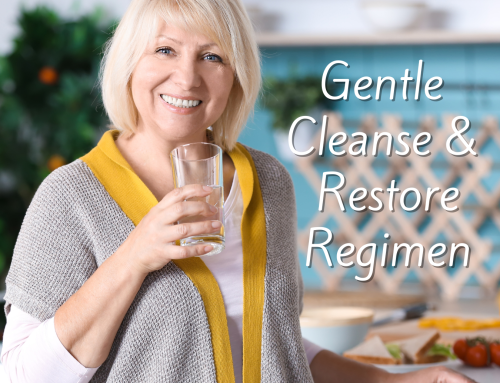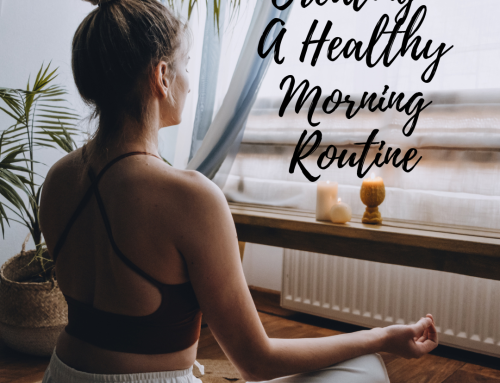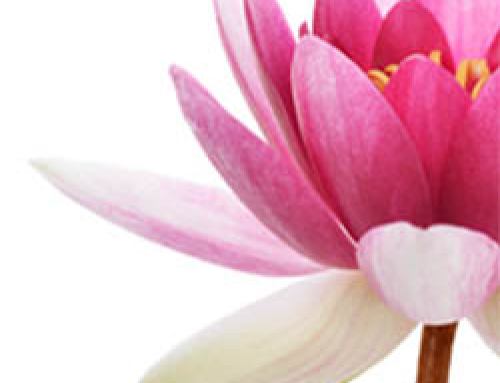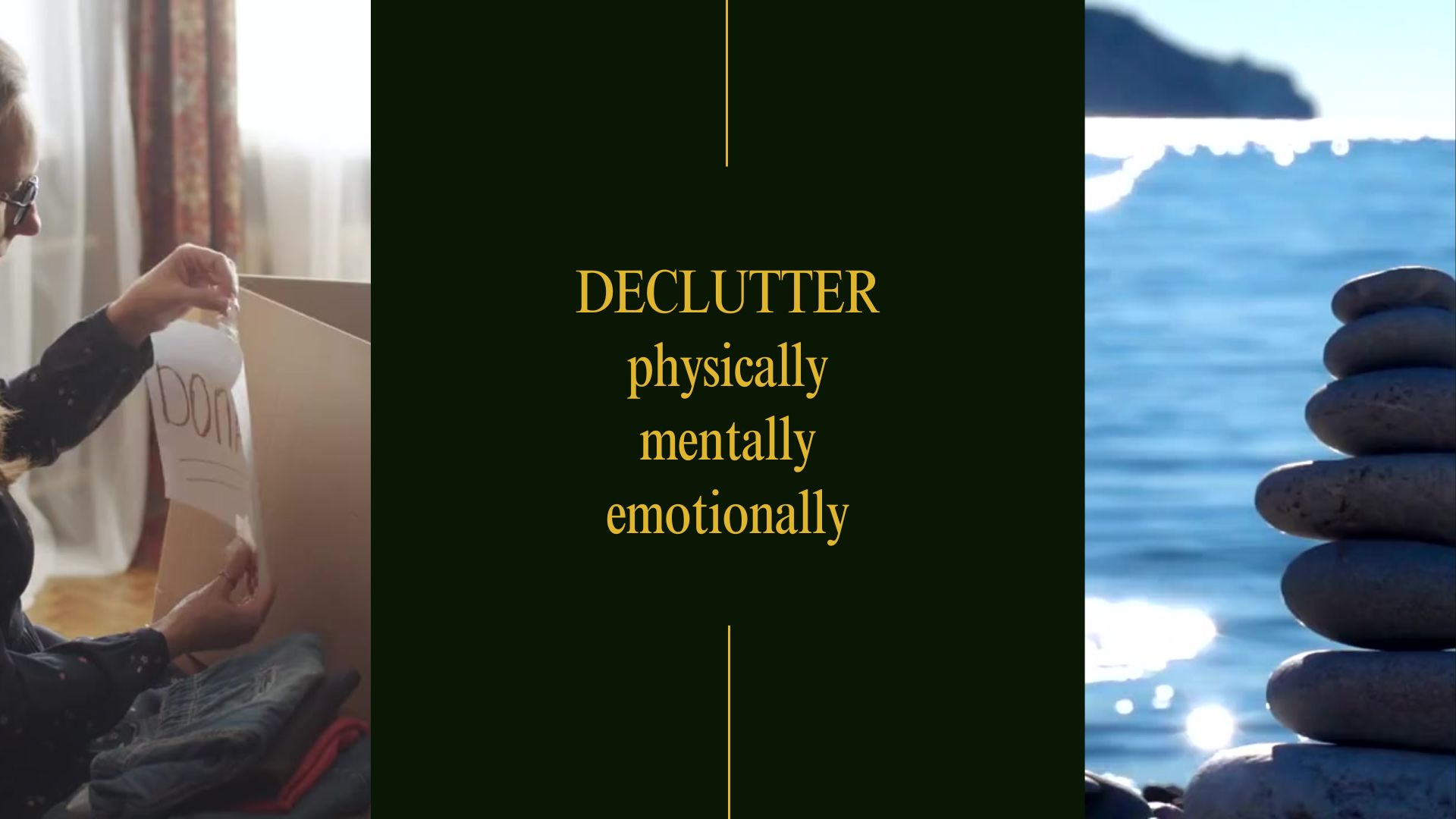
Decluttering can help us so much, in so many ways. Not only does it create more space physically but decluttering mentally and emotionally helps you to clear your thoughts, to let go of emotional baggage, helps reduce stress and anxiety – so you can feel calmer and more focused on what’s really important in your life.
Decluttering can be a transformative process that fosters a sense of order and tranquility.
Let’s start with some tips helping you declutter physically:
- Start Small and Focused
-
- Pick One Room, one section (single drawer, shelf, etc.) or one category (clothing, shoes, books, etc.): Tackle one at a time to avoid feeling overwhelmed.
- Set a Timer: Allocate a specific time (e.g., 15-30 minutes) for decluttering sessions.
- Prioritize
-
- Make a list: List areas or items in order of importance, work through your list.
- Track Progress: Check off completed tasks to stay motivated.
- Use the Four-Box Method
-
- Boxes: Label four boxes as Trash, Give Away/Sell, Keep, and Relocate.
- Sort: As you go through items, place them in the appropriate box.
- One-In, One-Out Rule
-
- Balance: For every new item brought into the home, remove an existing item.
- Consistency: Helps prevent clutter buildup.
- Have a Place for Everything
-
- Designated Spots: Assign specific places for all items.
- Consistency: Return items to their designated spots after use.
- Use Storage Solutions
-
- Maximize Space: Use vertical storage, under-bed bins, and multi-functional furniture.
- Organizers: Utilize drawer dividers, baskets, and shelves to keep items orderly.
- Implement a Rotation System
-
- Seasonal Items: Store out-of-season items and rotate them as needed.
- Review Regularly: Reassess items periodically to determine their usefulness.
Physical decluttering also helps us mentally because it creates an environment that reduces sensory overload and promotes a sense of order and control. When our physical spaces are cluttered, it can lead to feelings of chaos and overwhelm, which can, in turn, increase stress and anxiety levels. When we find ourselves in a clean and organized space, our mind can relax and focus more easily. This can help us focus better and improve clarity, productivity, and creativity. Decluttering itself can be quite therapeutic, creating a sense of calm and accomplishment.
Let’s take a closer look at ‘decluttering’ mentally and emotionally.
Decluttering mentally and emotionally is just as important as physical decluttering. By clearing the mind and letting go of emotional baggage, we can reduce stress and anxiety, starting to feel calmer and more focused. It can strengthen our emotional resilience and enable better decision-making. It can also boost productivity and creativity because a clear mind is more capable of focusing and coming up with new ideas. Decluttering mentally and emotionally can also help us improve relationships and communication — helping us create a more balanced, fulfilling, and harmonious life.
Here are some tips to help you declutter your mind and emotions:
- Digital Declutter
-
- Delete: Delete unused Apps or apps that actually make you feel stressed or take up too much time but aren’t productive or helpful.
- Organize Files: Create folders and a logical structure for your files. Clean out old or unnecessary files and documents on a regular basis.
- Email Management: Unsubscribe from emails or newsletters you are no longer interested in, organize your inbox, create folders, and delete old emails.
- Mindfulness and Meditation
-
- Daily Practice: Spend a few minutes each day practicing mindfulness or meditation to clear your mind and reduce stress. A few minutes EVERY day has a much greater effect than 30 minutes once a week!
- Deep Breathing: Incorporate deep breathing exercises into your daily routines to calm your mind and reduce feelings of stress.
- Journaling
-
- Express Thoughts: When we write down our thoughts, feelings, and worries, we get them out of our head and onto paper, freeing our mind.
- Reflection: Use your journal to reflect on your day, gain perspective, and evaluate what was/is important.
- Set Boundaries
-
- Learn to Say No: Protect yourself, your time and energy by setting boundaries and saying no to unnecessary commitments.
- Limit Social Media: Reduce the time you spend on social media platforms to avoid information overload, comparison stress, and free up time for selfcare and creativity.
- Prioritize Self-Care
-
- Regular Breaks: Take regular breaks throughout the day to rest and recharge. Incorporate breathing exercises, mindfulness, and essential oils.
- Healthy Habits: Maintain a balanced diet, exercise regularly, and get enough sleep.
- Practice Gratitude
-
- Journal: Write things into your journal you’re thankful for each day.
- Positivity: Shift your focus from what’s missing to what you have and all that’s good in your life.
- Let Go
-
- Forgiveness: Work on forgiving past wrongs (forgiving others, forgiving ourselves) to free yourself from lingering negative emotions.
- Therapy: Consider talking to a therapist or attend a support group if you find it challenging to let go of past issues on your own.
- Declutter Your Schedule
-
- Simplify: Remove non-essential tasks, limit time on draining tasks, freeing up time to focus on what truly matters.
- Manage Time: Use a planner or digital calendar to plan and organize your time more efficiently.
- Avoid Information Overload
-
- Selective Media Consumption: Be selective about what you watch and read in terms of the news and informative articles. Limit exposure to negative or sensational news.
- Focus on Positivity: Surround yourself with positive influences, people that cheer you one, listen to what’s important to you, and support you on your journey.
- Emotional Release
-
- Creative Outlets: Engage in creative activities that you enjoy or once enjoyed but haven’t taken the time for, like painting, writing, crafts, or music.
- Physical Activity: Use exercise as a way to release pent-up emotions and stress. Find like-minded people to exercise with and motivate each other.
- Foster Good Relationships
-
- Evaluate Connections: Assess your relationships, who uplifts and supports you, who drains your energy. Let go of toxic or draining connections. Communicate.
- Quality Time: Spend more time with people who uplift and support you.
- Practice Mindful Consumption
-
- Intentional Purchases: Be mindful of the things you buy and bring into your home to avoid physical and mental clutter.
- Focus on Experiences: Experiences rather than accumulating material possessions help us find balance, inner peace and more fulfilling life.
- Triggers
-
- Identify Triggers: Take note of what triggers negative emotions, overwhelm and overload and work on addressing or avoiding those triggers.
- Positive Affirmations: Use positive affirmations to reinforce a positive mindset. Incorporate them into daily routines or repetitive tasks, like while brushing your teeth or washing your hands.
Combining strategies for physical, emotional and mental decluttering can help us decrease stress and create a more balanced and peaceful state of mind.
Essential oils that can be of great help with ‘decluttering’ and letting go are:
Black Spruce
Thyme
Best ways to benefit from these essential oils:
Topical use: apply 1-2 drops to the inside of wrists (rub wrists together), over heart area, pulse points on the neck, and/or to the sole of one foot.
Aromatic use: inhale from palms or inside of wrists for a few minutes after application, use them aromatically during breathing exercises, diffuse 4-6 drops in a diffuser at home or 1 drop in a car diffuser.
I personally am never without the Forgive Blend or Cypress. It really helps me to let emotions flow through and out or release pent up tension, thoughts or emotions. I am so grateful to have these tools and using them regularly has helped me create more balance and peace in my life.
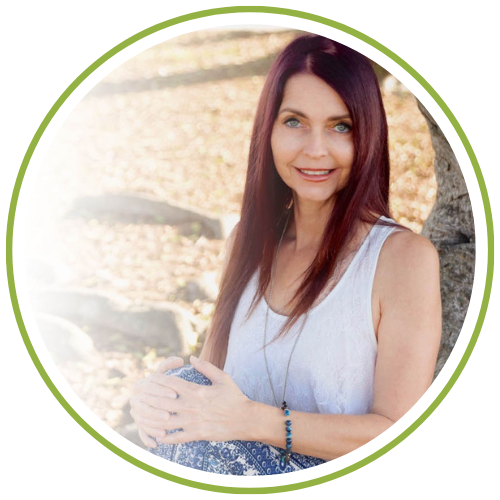
Essential Oil Questions?
Need personalized support?
Please connect with me here or schedule a free 20-minute wellness orientation.
Scarlet Strapko, NAHA Certified Professional Aromatherapist
Disclaimer
The information presented is for educational purposes only and not intended as a substitute for medical counseling. The statements made above have not been evaluated by the Food and Drug Administration. The products mentioned are not intended to diagnose, treat, cure, or prevent any disease or illness.


